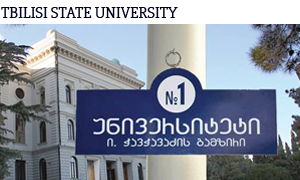
FACULTY OF LAW
THE STOCK MARKET IN GEORGIA: THE CURRENT REALITY AND AN UNCERTAIN FUTURE
Development, economic growth and raising the standard of living in the country are all linked directly to capital market development. One of the real levers, and the most acceptable and practical forms of investment are to invest in equities through the stock market. It is clear for the developed world how important the organized stock market is. This includes Western Europe, USA, Canada, Japan, China and other countries with powerful stock industries such as the New York Stock Exchange; Euronext; NASDAQ OMX; the London Stock Exchange and many others. The mediation business or brokerage/investment firms include Merrill Lynch; Morgan Stanley; Goldman Sachs; J.P. Morgan; Barclays Capital and many other investment banks. The Georgian Investment Group + (or GIG+) is headed by Davit Aslanishvili, Assistant Professor at the Department of Finance and Banking of the TSU Faculty of Economics and Business. He serves as Chairman of Supervisory Board and has conducted many studies on the Georgian stock market, its development and current situation.
The Georgian Stock Exchange (GSE) was established with the financial support of USAID and Barents Group in 2000. Immediately after its establishment, the Law of Georgia on Securities Market was developed and in 2004-2008 there were 42 brokerage firms in the country. These, under Georgian legislation, are institutions equal to investment banks. However, due to tightened regulations that came into effect after 2008, their number actually dropped dramatically and currently there are only seven members of the GSE left, of which three are independent and four are subsidiaries of commercial banks. Professor Aslanishvili explained that for objective or subjective reasons, in Georgia stock market development was delayed at a certain stage.
Normally the activity of a brokerage firm is directly connected with +public trading at a stock exchange, and carried out in an open and transparent environment. This process is related only to market price. In 2000-2007 Georgia faced the problem of “closed bidding.” Aslanishvili pointed out that at the initiative of the Georgian Investment Group, the rules of bidding were changed at the stock exchange and the so-called “N parameter” was abolished. However, shortly thereafter the ruling political and economic teams implemented decisive measures against free price formation in Georgia. Research has ascertained that Georgia failed to achieve results anywhere near those of developed countries, with miserable results caused by problems between the two basic means of attracting monetary resources --bank loans and the stock market.
In financially successful and developed countries, these two mechanisms--bank loans and the stock market—are designed to attract money and create a mutually beneficial synergy. In Georgia, there is only one mechanism to attract money resources –the bank loan. In general the Georgian commercial banking system tries its utmost to prevent the use of the second mechanism, the stock market, since it is considered a main competitor.
The analysis of the structure of owners of Georgian Stock Exchange (source: securities registrar JSC Kavkasreestri) shows that as of 2014, 56% of shares of the stock exchange were owned by its competitors – Georgian commercial banks. In the author’s opinion, it means that Georgian commercial banks will not allow the development of their competitor—the stock market--as it threatens their own preferential and successful financial position. According to this analysis, the situation is further complicated by the fact that under the legislation amended in 2008, both spheres of the monetary market have one mega regulator – the National Bank of Georgia.
Aslanishvili says that “an essential attribute of the stock market – the National Securities Commission of Georgia – was abolished by so-called ‘liberal legislative amendments’ made in 2007-2008. The powers of the NSC were transferred to the regulator of Georgian commercial banks and lobbyist of their interests, the National Bank of Georgia. Simultaneously, very tough policies were enacted against brokerage firms, and as a result—as of 2014--there are practically no non-banking brokerage firms in Georgia.”
According to the study, the statistical results of Georgia’s stock industry are as follows: In 2000-2002, the shares of 282 Georgian joint stock companies were admitted to trading on the Georgian Stock Exchange, while 147 joint stock companies were potentially discussing the admission of shares to the stock exchange. This amount actually remained unchanged by 2007.
In 2003 there were 278 joint stock companies admitted to trading at GSE; in 2004 – 276; in 2005 – their number was reduced to 253 and in 2006 – to 242. A small number of companies was included in so-called ‘Listing A’ and ‘Listing B’ tiers. The JSC Bank of Georgia was trading on two exchanges – the Georgian Stock Exchange and London Stock Exchange. Since 2008, when the restrictive legislative amendments were approved, there has been no “civilized” possibility for equity trading in Georgia, meaning that if there is a willingness to trade, securities admitted to the stock exchange can be transferred by simple inscription on paper, without any auction or trading – it is enough simply to sign the document. What is most important, this method has made the process of monitoring cash transactions absolutely opaque.
As the analysis shows, in parallel with the changes taking place in 2007-2008, the management of joint stock companies gradually lost any interest in equity trading in an open and transparent environment, once the law didn’t require it. Thus, in 2006 there were 242 companies in the stock exchange’s trading system (without listing), in 2007 their number was reduced to 161 and in 2013 reduced to 129. During the same period, the stock exchange turnover radically decreased in Georgia. In 2006-2007 the turnover of the trading system, including transactions concluded in an open and transparent environment – despite the N parameter obstacle – amounted to GEL 167-169 million. In 2008 it decreased 14-fold (i.e. a 1400% decrease) and continued to decrease in the following years. In 2013, the country’s stock exchange turnover amounted to GEL 530,491 or 338-fold less compared to 2007.
The problem of the Georgian stock market has been further aggravated by the global economic crisis. The author of the research stated that during global crises a civilized state tries to support businesses, which did not happen in Georgia. Following the worsening economic, legislative and market situation, the regulator (National Bank of Georgia) increased the authorized capital requirements for brokerage firms, which had already been left without any function or their main sources of income. To make matters worse the NBG abolished three types of licenses and only recognized a General License for which requirements in practice could be met only by commercial banks and their subsidiaries. Today, a brokerage firm is required to have a capital of GEL 360 000, and in 2015 it must have GEL 500 000 to maintain its license. According to this complicated scheme of capital recognition, only money resources are considered as a source of capital replenishment, which--against the background of market failure--does not enable an independent brokerage firm to compete with subsidiaries of commercial banks. Thus, the actual disappearance of the securities market industry as an alternative to a bank loan is now a fact. This is used by the National Bank of Georgia to promote the obedience of the securities market to the commercial banking sector (i.e. competitive structure).
As for the number of transactions made outside the stock exchange and any transparent environment, “fixing” amounted to 3453 trades in Georgia in 2008-2014 according to research carried out by GIG+. Their total amount in shares was 5,054,520,669 units, and the total value was GEL 1,233,305,848. This means that the “grey” market exceeded the amount of the open market 24-fold in 2008, 32-fold in 2009, 19-fold in 2010, 8-fold in 2011, 90-fold in 2012 and 100-fold in 2013. According to Professor Aslanishvili, it means that the country’s stock market was replaced by a grey, non-transparent, “wild-liberal” market. He argues that at this stage Georgia’s stock exchange has lost its key function as a foundation for price formation in the stock market. Therefore, any trading in shares or other securities has become senseless. The researcher suggests legislative amendments as a solution, and he noted that in order to save and develop Georgia’s stock exchange, a package of amendments to resolve the situation has been submitted to the Parliamentary Committee on Finance and Budget, however it has yet to be put on the Georgian Parliament’s agenda.




